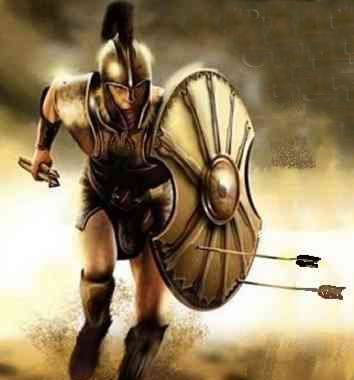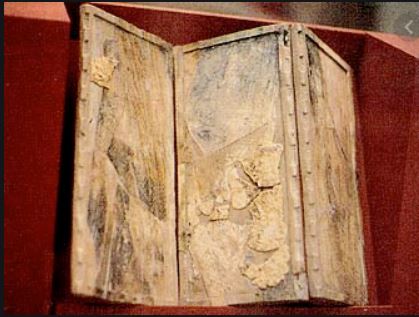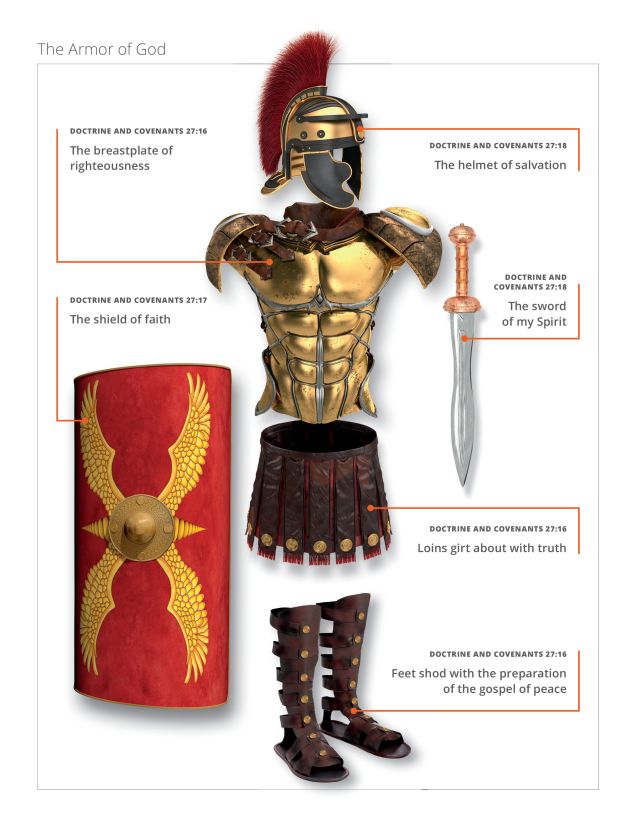To accompany your Come Follow Me study for March 24-30
In addition to reading sections 27-28 this week, you will also want to:
- Read “A Mission to the Lamanites,” Revelations in Context, 45-49
- Read “All Things Must Be Done in Order,” Revelations in Context, 50-53
- Read Chapter 11: Doctrine and Covenants 26–28 (churchofjesuschrist.org)
- Read Joseph Smith’s Revelations, Doctrine and Covenants 27 (churchofjesuschrist.org)
- Read Joseph Smith’s Revelations, Doctrine and Covenants 28 (churchofjesuschrist.org)
- See the following videos:
- See the related Kahoot game at https://create.kahoot.it/share/doctrine-and-covenants-27-28/30fd4834-c767-4a30-a541-068703226561. To use it with a group, after clicking on this link, you will need to log into Kahoot, creating a free account if you have not done so previously, then click on the blue “Host Live” button or the gray “Assign” button, depending on how you wish to use the Kahoot. Some of the Kahoot questions may presuppose that the player has read through the suggested answers to the following Points to Ponder and at least has browsed the Institute student manual as well.
Points to Ponder in Doctrine and Covenants 27-28
1. Considering that verses 5–18 of Doctrine and Covenants 27 were received a month after verses 1–4, why do you think they were combined into a single section?
2. What plausible reasons can you think of for which the Lord might have instructed Joseph Smith not to buy wine from his enemies?

3. Based on Doctrine and Covenants 27:2, would it be permissible to substitute beef jerky and tomato juice for bread and water in the sacrament? Please explain.

4. Which Old Testament prophecy, frequently referenced by Latter-day Saint missionaries, is confirmed in this section as pertaining to the Book of Mormon?
5. What insights does Doctrine and Covenants 27 provide about the identity of “Elias,” who is to participate in a future sacrament service and to whom the Lord entrusted “the keys of bringing to pass the restoration of all things”?
6. Some Latter-day Saints speculate that the future banquet and sacrament service with the Savior will coincide with His pre-Millennial visit to Adam-ondi-Ahman. What in Doctrine and Covenants 27 suggests it will occur after the Second Coming?

7. In Doctrine and Covenants 27:15–18, the Lord describes the “armor of God.” How can each piece of this spiritual armor be applied in our daily lives to protect against modern challenges and temptations?

8. What was problematic about Hiram Page receiving revelations? If Joseph Smith received revelations through a seer stone, why couldn’t others do the same?

9. Why was Oliver Cowdery particularly suited to address Hiram Page regarding the seer stone issue?
10. Why might it have been acceptable for Oliver Cowdery to “speak … by way of commandment” and “have revelations” but not to “write them … by way of commandment”? What is the distinction? (Doctrine and Covenants 28:4–8)
11. According to the teachings and implications of Doctrine and Covenants 28, which of the following scenarios are acceptable?
a. A young man tells his bishop he has received a revelation that his mission call is sending him to the wrong place and that he really should be serving in Russia.
b. A bishop gets a revelation to tell the young man to confess some unresolved sin that is causing him to get false revelations.
c. A Sunday School teacher commands his class in the name of the Lord to read their scriptures for an hour a day.
d. A Sunday School teacher tells his class the Lord has revealed to him where the city of Zarahemla was located.
e. A Sunday School teacher bears an inspired testimony to the truthfulness of a scriptural passage.
f. A missionary tells his senior companion that he feels impressed that they should read the Book of Mormon together during companionship study time.
g. A young man receives a revelation that he ought to propose marriage to a certain young lady.
h. The young man tells the young lady that she should marry him because he has received a revelation telling him it is right.
i. The young lady tells the young man she has received her own revelation that says she shouldn’t marry him.
j. A member receives a prompting on how the ministering districts might be reorganized, including who should be assigned to Brother Jones, and tells the elders quorum president he has received a revelation to that effect.
k. A member receives the same prompting but keeps it to himself or presents it to the elders quorum president as a suggestion that he feels strongly about without claiming to have received a revelation or presuming to command his superior.
l. A bishop’s counselor feels a prompting to share certain counsel with the bishop.
m. The same counselor orders the bishop to accept his revelation

12. What do you find significant about the Lord’s instructions to Oliver Cowdery to declare the “gospel with the sound of rejoicing”?
13. Doctrine and Covenants 27:2 emphasizes partaking of the sacrament with an “eye single to [God’s] glory.” How can we ensure our focus remains on the Savior during the sacrament, and what blessings might come from such focused worship?
Possible Answers to Points to Ponder in Doctrine and Covenants 27-28
1. Considering that verses 5–18 of Doctrine and Covenants 27 were received a month after verses 1–4, why do you think they were combined into a single section?
Probably because they all deal with some aspect of the sacrament–either the appropriate emblems or the future Millennial sacrament service following the Second Coming.
2. What plausible reasons might the Lord have had for instructing Joseph Smith not to purchase wine from his enemies?
The revelation itself does not give a reason, but it could have been any or all of the following:
- To avoid supporting the enemies of the Church financially
- To avoid the possibility that his enemies would poison the wine or be in a position to otherwise harm Joseph either before or after completing the purchase
- To save money for the struggling new church
It almost certainly had nothing to do with the Word of Wisdom, which hadn’t been given yet. And after receiving this revelation, Joseph did go home and prepare homemade wine for the sacrament service. And some Latter-day Saints continued to use wine for the sacrament as late as 1906.
3. Based on Doctrine and Covenants 27:2, would it be permissible to substitute beef jerky and tomato juice for bread and water in the sacrament? Please explain.
Not unless you were the bishop and were in charge of the service, in which case you’d theoretically be authorized to make such a substitution. The question of whether such unusual replacements for bread and water would be appropriate might depend on whether anything more conventional were available. Almost always one would be able to find water and something more like the traditional bread than beef jerky. However, I have been on long Scout backpacking trips on a Sunday when I was bishop, and we had a perfectly good sacrament service with pieces of tortilla or crackers.
4. Which Old Testament prophecy, frequently referenced by Latter-day Saint missionaries, is confirmed in this section as pertaining to the Book of Mormon?
Ezekiel 37:16, which speaks of “the stick of Ephraim,” which together with the “stick of Judah,” or the Bible, would become as one in the Lord’s hand.

5. What insights does Doctrine and Covenants 27 provide about the identity of “Elias,” who is to participate in a future sacrament service and to whom the Lord entrusted “the keys of bringing to pass the restoration of all things”?
D&C 27:7 tells us that this Elias is the same one who told Zacharias that he would be the father of John the Baptist. But in Luke 1:17-19, that messenger introduced himself to Zacharias as Gabriel. According to Joseph Smith, Gabriel was the same as Noah. It is of interest that Joseph Smith also said that Noah “stands next in authority to Adam in the Priesthood.”

6. Some Latter-day Saints speculate that the future banquet and sacrament service with the Savior will coincide with His pre-Millennial visit to Adam-ondi-Ahman. What in Doctrine and Covenants 27 suggests it will occur after the Second Coming?
27:14 indicates that those in attendance will include “all those whom my Father hath given me out of the world.” The gathering at Adam-ondi-Ahman, on the other hand, as significant as it may be, is to be a much more limited group.
Elder Joseph Fielding Smith wrote: “When this gathering [at Adam-ondi-Ahman] is held, the world will not know of it; the members of the Church at large will not know of it, yet it shall be preparatory to the coming in the clouds of glory of our Savior Jesus Christ as the Prophet Joseph Smith has said. The world cannot know of it. The Saints cannot know of it—except those who officially shall be called into this council—for it shall precede the coming of Jesus Christ as a thief in the night, unbeknown to all the world.”
7. In Doctrine and Covenants 27:15–18, the Lord describes the “armor of God.” How can each piece of this spiritual armor be applied in our daily lives to protect against modern challenges and temptations?

Applying the armor of God involves:
- Loins girt about with truth: Embracing honesty and integrity in all interactions.
- Breastplate of righteousness: Living a virtuous and moral life.
- Feet shod with the preparation of the gospel of peace: Being ready to share and live the gospel principles.
- Shield of faith: Trusting in God’s promises and power to overcome doubts.
- Sword of the Spirit: Living and speaking under the influence of the Holy Ghost.
8. What was problematic about Hiram Page receiving revelations? If Joseph Smith received revelations through a seer stone, why couldn’t others do the same?
All can receive revelation for themselves or related to their own stewardships. But, as Joseph Smith taught, “It is contrary to the economy of God for … any one to receive instructions for those in authority higher than themselves.”
9. Why was Oliver Cowdery particularly suited to address Hiram Page regarding the seer stone issue?
Oliver was Hiram’s brother-in-law, as both had married Whitmer girls. Hiram could thus view Oliver as a friend, where he would have been likely to view Joseph Smith as a competitor, with his own vested interests.
10. Why might it have been acceptable for Oliver Cowdery to “speak … by way of commandment” and “have revelations” but not to “write them … by way of commandment”? What is the distinction? (Doctrine and Covenants 28:4–8)
Probably because the written word tends to take on a kind of permanent authority which would be appropriate for only Joseph Smith to initiate. It would be appropriate, however, for Oliver to speak under inspiration for the benefit of a specific congregation at a specific time and place.
11. According to the teachings and implications of Doctrine and Covenants 28, which of the following scenarios are acceptable?
a. A young man tells his bishop he has received a revelation that his mission call is sending him to the wrong place and that he really should be serving in Russia.
b. A bishop gets a revelation to tell the young man to confess some unresolved sin that is causing him to get false revelations.
c. A Sunday School teacher commands his class in the name of the Lord to read their scriptures for an hour a day.
d. A Sunday School teacher tells his class the Lord has revealed to him where the city of Zarahemla was located.
e. A Sunday School teacher bears an inspired testimony to the truthfulness of a scriptural passage.
f. A missionary tells his senior companion that he feels impressed that they should read the Book of Mormon together during companionship study time.
g. A young man receives a revelation that he ought to propose marriage to a certain young lady.
h. The young man tells the young lady that she should marry him because he has received a revelation telling him it is right.
i. The young lady tells the young man she has received her own revelation that says she shouldn’t marry him.
j. A member receives a prompting on how the ministering districts might be reorganized, including who should be assigned to Brother Jones, and tells the elders quorum president he has received a revelation to that effect.
k. A member receives the same prompting but keeps it to himself or presents it to the elders quorum president as a suggestion that he feels strongly about without claiming to have received a revelation or presuming to command his superior.
l. A bishop’s counselor feels a prompting to share certain counsel with the bishop. (That’s what he’s there for.)
m. The same counselor orders the bishop to accept his revelation. (That’s different and is inappropriate.)
The key here is that all are authorized to receive revelation for their own lives and areas of stewardship but not to receive revelation to direct others for whom they have no stewardship or to reveal doctrine that it would be the right of the President of the Church to reveal, should he be so inspired.
12. What do you find significant about the Lord’s instructions to Oliver Cowdery to declare the “gospel with the sound of rejoicing”?
Possible implications could include:
- The gospel is “good news” and should make people happy. Rather than try to scare his listeners into trying to avoid a fearsome hell, Oliver was to entice people with the joys of heaven, including the “heaven on earth” the righteous can experience here and now.
- A reminder to Oliver that he should put a smile on his face and show happiness himself, as a missionary. No one is likely to want to listen to a preacher whose implied message is that the gospel has made him sad and solemn.
- Oliver should not think the Lord is angry with him, despite his having been temporarily deceived by Hiram Page’s spurious revelations. The Lord is quick to forgive, and Oliver should now go on his way rejoicing.

13. Doctrine and Covenants 27:2 emphasizes partaking of the sacrament with an “eye single to [God’s] glory.” How can we ensure our focus remains on the Savior during the sacrament, and what blessings might come from such focused worship?
To maintain focus on the Savior during the sacrament, we can engage in personal reflection on His atoning sacrifice, ponder the covenants we renew, and express silent gratitude for His blessings. Such focused worship can deepen our spiritual connection, enhance our commitment to discipleship, and invite the Holy Spirit into our lives.
